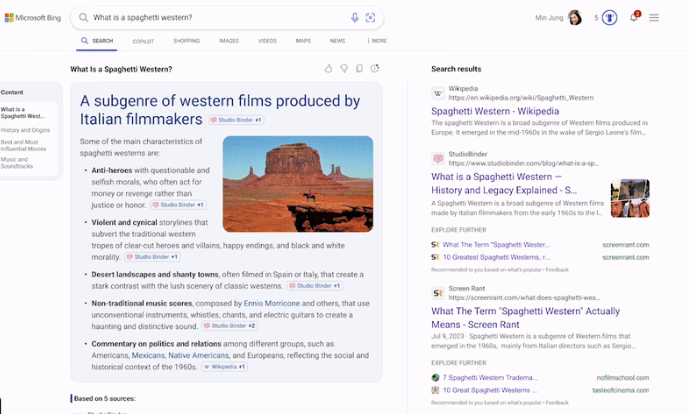Microsoft rolls out Bing generative search feature
Users can still access conventional search results through a sidebar

What’s new for Microsoft Bing
Microsoft has introduced AI-powered generative search to Bing. This feature leverages generative AI and large language models (LLMs) to deliver more dynamic responses to user queries. Currently, this new feature is being made available to a limited group of users, rather than all Bing users
What it offers
The new generative search feature combines LLMs and small language models (SLMs) to analyze and understand user queries. By reviewing millions of sources, Bing generates tailored responses that not only answer the query but also provide additional context relevant to the search term. This feature is designed to enhance how users interact with Bing, making search results informative, more engaging, and “fulfill the intent of the user’s query more effectively.”
How it works
Bing’s generative search now offers responses that go beyond traditional search results. Here’s what it does:
The AI examines the user’s search query deeply and reviews a vast number of sources to gather information related to the query. This means the search results are based on a broad and diverse range of data.
Based on the query and the reviewed information, then selects and matches relevant content. This means the search results are tailored to fit the specific needs of the user’s query.
Balancing AI with traditional search
Early evaluations show that Bing’s generative search maintains web traffic levels for publishers. Therefore, integrating AI does not reduce the number of clicks to external sites.
Bing merges its traditional search results with the latest AI capabilities. Microsoft emphasizes that this new search experience is designed to complement traditional search results rather than replace them.
“The generative search experience is designed with this in mind, including retaining traditional search results and increasing the number of clickable links, like the references in the results.”
This means that while users still get the usual list of search results, these results are now enhanced by AI technology. Users still have access to familiar search formats while benefiting from the advanced capabilities of AI-generated content.
Practically, when users use this generative search feature on Bing, they will see two main types of results on their screen. First, at the top of the search page, users see an AI-generated summary of their query. This summary provides a detailed, easily readable explanation or overview based on the search term.
Secondly, besides this AI-generated summary, you'll still find the usual search results in a sidebar or a separate section. These traditional results consist of a list of web pages, articles, or other sources relevant to your query, allowing users to further get information about a topic.
Microsoft's approach addresses concerns within the industry about the impact of AI on content creation and website traffic. The company assures that this new search experience is designed to maintain the same level of website traffic as traditional search methods, though its long-term effects on content monetization and traffic remain to be seen.

